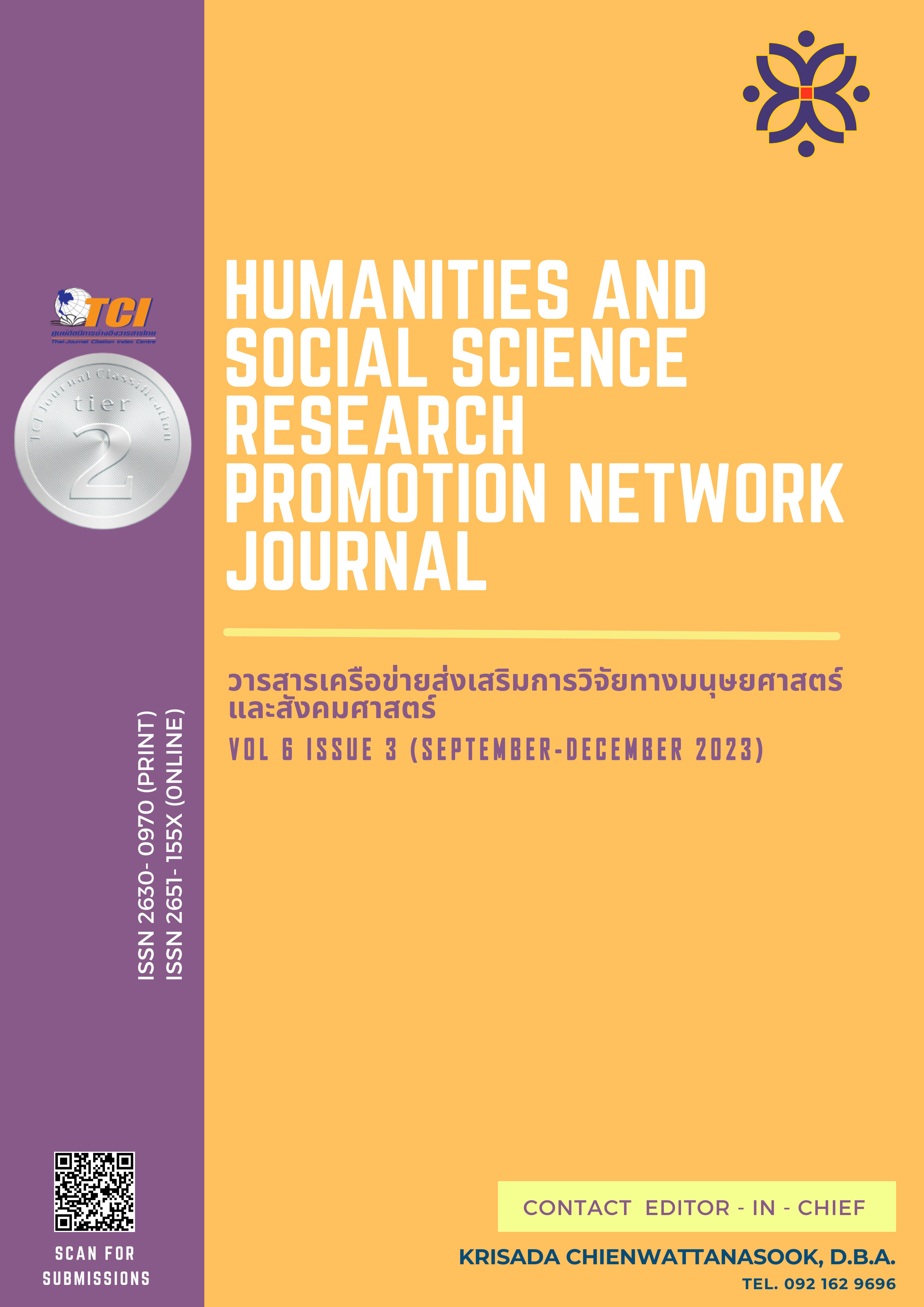การศึกษาไทยในสายตานักศึกษาต่างชาติ: กรณีศึกษา วิทยาลัยนานาชาติ มหาวิทยาลัยศิลปากร
คำสำคัญ:
การศึกษาต่างประเทศ , การปรับตัวทางด้านวัฒนธรรม, นักศึกษาต่างชาติบทคัดย่อ
โครงการนี้มุ่งทำความเข้าใจมุมมองนักศึกษาต่างชาติในประเทศไทยที่มีต่อการศึกษาในหลักสูตรนานาชาติในประเทศไทย โดยเน้นทำความเข้าใจแรงจูงใจ การปรับตัวให้เข้ากับสังคมการเรียนที่ประเทศไทย และทัศนคติของนักศึกษาต่างชาติที่มีต่อการเรียนในประเทศไทย เพื่อจัดทำแนวทางในการจัดการเรียนการสอนหลักสูตรนานาชาติในประเทศไทยเพื่อให้ตอบรับกับนักศึกษาต่างชาติได้อย่างมีประสิทธิภาพมากขึ้น การศึกษานี้เป็นการวิจัยเชิงคุณภาพ โดยใช้กรณีศึกษาเป็นนักศึกษาต่างชาติที่เป็นนักศึกษาปัจจุบันที่วิทยาลัยนานาชาติที่มหาวิทยาลัยศิลปากรจำนวน 15 คน การศึกษาพบว่านักศึกษาต่างชาติเข้าศึกษาที่วิทยาลัยนานาชาติด้วยแรงจูงใจต่าง ๆ แรงจูงใจส่วนตัว แรงจูงใจจากหลักสูตรที่เปิดสอนในมหาวิทยาลัย และแรงจูงใจที่มาจากสถานที่ตั้งโรงเรียน นักศึกษาต่างชาติมีความสามารถในการปรับตัวให้เข้ากับประเทศและวัฒนธรรมไทยที่ต่างกัน ความแตกต่างระหว่างวัฒนธรรมไทยและวัฒนธรรมประเทศของนักศึกษาต่างชาติ ความสามารถในการสื่อสาร ความสามารถในการเข้าถึงคนท้องถิ่น ประสบการณ์ต่างประเทศและบุคลิกภาพ นอกจากนี้ การศึกษายังพบว่านักศึกษาต่างชาติจะมีทัศนคติที่เป็นบวกหรือที่เป็นลบนั้น ขึ้นอยู่กับปัจจัยหลายประการ เช่น การเรียนการสอน อุปกรณ์และสิ่งอำนวยความสะดวกในการเรียน การให้การสนับสนุนนักเรียนต่างชาติ ผลการศึกษาดังกล่าวนำมาจัดทำข้อเสนอแนวทางในการจัดการเรียนการสอน โดยที่การเรียนการสอนควรมุ่งพัฒนาองค์ประกอบ 3 องค์ประกอบได้แก่ การสร้างแรงจูงใจให้นักศึกษาต่างชาติอย่างเหมาะสม 2) การพัฒนาด้านการเรียนการสอน และ 3) การให้บริการสนับสนุนนักเรียนต่างชาติ
เอกสารอ้างอิง
กมลทิพย์ รักเกียรติยศ, ฐิตินันท์ ผิวนิล, ธนัชพร นามวัฒน์, และ สุนทรารัตน์ เขื่อนควบ. (2560). การปรับตัวทางวัฒนธรรม การเรียนรู้ และการสื่อสารของนักศึกษาจีนในวิทยาลัยราชภัฎเพชรบุรี. วารสารมนุษยศาสตร์และสังคมศาสตร์ มหาวิทยาลัยมหาสารคาม, 36(2), 60-71.
Abbas, J., Alturki, U., Habib, M., Aldraiweesh, A., & Al-Rahmi, W. M. (2021). Factors Affecting Students in the Selection of Country for Higher Education: A Comparative Analysis of International Students in Germany and the UK. Sustainability, 13(18), 10065.
Bendassolli, P. F. (2013). Theory Building in Qualitative Research: Reconsidering the Problem of Induction. Forum Qualitative Sozialforschung Forum: Qualitative Social Research, 14(1). https://doi.org/10.17169/fqs-14.1.1851
Bordovskaia, N. V., Anderson, C., Bochkina, N., & Petanova, E. I. (2018). The Adaptive Capabilities of Chinese Students Studying In Chinese, British and Russian Universities. International Journal of Higher Education, 7(4), https://doi.org/10.5430/ijhe.v7n4p1
Colwell, B. W. (2006). Partners in a community of learners: Student and academic affairs at small colleges. New Directions for Student Services, 116, 53-66.
Gong, Y., Gao, X., Li, M., & Lai, C. (2021). Cultural adaptation challenges and strategies during study abroad: New Zealand students in China. Language, Culture and Curriculum, 34(4), 417-437.
Huang, Y.-H. I. (2023). International student mobility in Asia: Where students go and why?. https://theacademic.com/international-student-mobility-in-asia/#:~:text=Regional%20educational%20hubs%20are%20top,coming%20from%20other%20Asian%20countries.
Kang, S., Pradtana Y., Panyadee, C., & Ek-em, B. (2019). Influencing Factors of Cross-cultural Adaptation Process of Chinese Students Studying in the Upper Northern Thai Universities. Mediterranean Journal of Social Sciences, 10(1), 65-74.
Kang, S., Yossuck, P., Panyadee, C., & Ek-lem, B. (2020). Chinese Students’ Cross-Cultural Adaptation Process and Their Main Difficulties Encountered While Studying in the Upper Northern Thai Universities. Humanities, Arts and Social Sciences Studies, 20(2), 343-372.
Kim, Y. Y. (2001). Becoming intercultural: An integrative theory of communication of cross-cultural adaptation. Sage.
Kim, Y. Y. (2005). Adapting to a New Culture: An Inteegrative Communication Theory. In W. Gudykunst (Ed.), Theorizing about Intercultural Communication: An Introduction. Sage.
Lewis, T., & Niesenbaum, R. A. (2005). Extending the Stay: Using Community-Based Research and Service Learning to Enhance Short-Term Study Abroad. Journal of Studies in International Education, 9(3), 251-264.
Liu M., & Huang, J. (2015). Cross-Cultural adjustment to the United States: the role of contextualized extraversion change. Frontiers in Psychology, 6, 1650.
Migration Data Portal. (2023). International students. https://www.migrationdataportal.org/themes/international-students
Ngamkamollert, T., & Ruangkanjanases, A. (2015). Factors Influencing Foreign Students’ Satisfaction toward International Program in Thai Universities. International Journal of Information and Education Technology, 5(3), 170-178.
Poyrazli, S., Kavanaugh, P. R., Baker, A., & Al-Timimi, N. (2004). Social support and demographic correlates of acculturative stress in international students. Journal of College Counseling, 7(1), 73-83.
Razinkina, E., Pankova, L., Trostinskaya, I., Pozdeeva, E., Evseeva, L., & Tanova, A. (2018). Student satisfaction as an element of education quality monitoring in innovative higher education institution. E3S Web of Conferences, 33, 1-8.
Rujipark, V. (2016). Cultural and Psychological Adjustment of International Students in Thailand. International Journal of Behavioral Science, 11(2), 127-142.
Sahin, I. (2007). Predicting student satisfaction in distance education and learning environments. Turkish Online Journal of Distance Education, 8(2), 113-119.
Statista. (2023). Top host destination of international students worldwide in 2020, by number of students. https://www.statista.com/statistics/297132/top-host-destination-of-international-students-worldwide/#:~:text=Regional%20educational %20hubs%20are%20top,coming%20from%20other%20Asian%20countries.
Sumer, S., Poyrszli, S., & Grhame, K. (2008). Predictors of depression and anxiety among international students. Journal of Counseling & Development, 86, 429-439.
Townsend, P., & Poh, H. J. (2008). An exploratory study of international students studying and living in a regional area. Journal of Marketing for Higher Education, 18(2), 240-263.
UNESCO. (2023). First session of the Intergovernmental Conference of States Parties to the Global Convention on Higher Education. https://www.unesco.org/ en/articles/first-session-intergovernmental-conference-states-parties-global-convention-higher-education
Wang, Y. (2004). Pursuing cross-cultural graduate education: A multifaceted investigation. International Education, 33(2), 52-72.
ดาวน์โหลด
เผยแพร่แล้ว
รูปแบบการอ้างอิง
ฉบับ
ประเภทบทความ
สัญญาอนุญาต
ลิขสิทธิ์ (c) 2023 ธัญญา ลัญฉประสิทธิ์, รัตนพงศ์ คงเจริญ, วิสวัส ทองธีรภาพ, สุดาวดี จันทร์ภิวัฒน์, เนตรชนก ฤทธาคนี

อนุญาตภายใต้เงื่อนไข Creative Commons Attribution-NonCommercial-NoDerivatives 4.0 International License.
บทความที่ได้รับการตีพิมพ์เป็นลิขสิทธิ์ของ ผู้เขียน
ทัศนะและความคิดเห็นที่ปรากฏในบทความในวารสารเครือข่ายส่งเสริมการวิจัยทางมนุษยศาสตร์และสังคมศาสตร์จะถือเป็นความรับผิดชอบของผู้เขียนบทความนั้น และไม่ถือเป็นทัศนะและความรับผิดชอบของกองบรรณาธิการ








